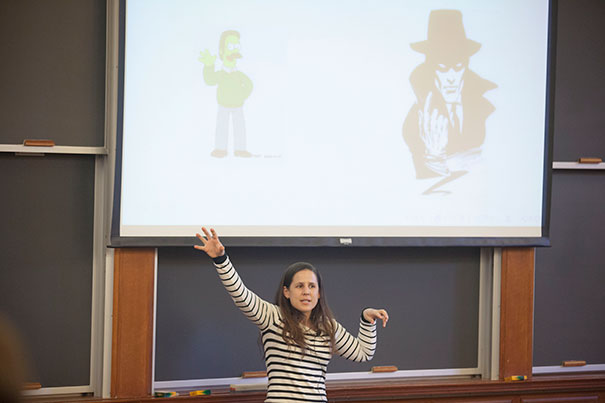
Why we write a check or cast a ballot is often for the same reason that we buy Girl Scout cookies or Tupperware: pressure to conform with a group, Betsy Sinclair told her Harvard Law School audience.
Kris Snibbe/Harvard Staff Photographer
Peer pressure in politics
It’s a force to be reckoned with in voting or campaign funding
Many people believe that idealism motivates them to open their wallets for a favorite candidate or that civic duty motivates them to go to the polls to vote. But don’t discount peer pressure as an important factor in elections, a political scientist says.
“We operate as a family, a neighborhood, a team,” said Betsy Sinclair, an assistant professor at the University of Chicago. “Family, friends, and neighbors affect” choices involving “the candidate, issues to support, the political party to identify with, whether to donate to political candidates, and whether we turn out to cast a ballot.”
Sinclair, author of the new book “The Social Citizen: Peer Networks and Political Behavior,” spoke Thursday at Harvard Law School’s Austin Hall about how social networks enforce behavior in American politics. Her lecture was titled “Mind Sciences and the Election: The Social Citizen.”
Why we write a check or cast a ballot is often for the same reason that we buy Girl Scout cookies or Tupperware: pressure to conform with a group. Sinclair came to that realization after observing a fundraising coffee session for a 2009 Democratic U.S. House candidate from Illinois, Julie Hamos.
The coffee klatch was held in an affluent, politically engaged Chicago district. The two previous election cycles, this group backed another candidate. But this time, the hostess invited Hamos to speak. When the candidate finished her remarks, the hostess asked everyone to get out their checkbooks. Many wrote checks, according to Sinclair.
The candidate lost. Sinclair, in her post-mortem, learned that many guests regretted backing the loser.
Sinclair called the pressure to back Hamos “the Tupperware effect,” where people are invited to a party for the plastic container ware and drink coffee, hear testimony about its worth, and then pony up money for their own plastic ware, just like at the campaign meeting.
“People reported a sense of social obligation,” Sinclair said. “Campaigns know this works.”
Indeed, Sinclair pointed to another congressional candidate fundraiser invitation. It listed the names of all the invitees to pressure as many people who knew others on the list to attend as possible.
Fundraising is one thing. No one believes his or her vote can be influenced. Yet, Sinclair said, we all believe we can persuade an acquaintance to vote for the candidate we support. The ability of one person to influence another person can be demonstrated by analyzing a get-out-the-vote effort.
In 2009, Sinclair put her theory to the test after U.S. Rep. Rahm Emanuel stepped down from his seat to take a job in the Obama White House. She picked a tiny nine-digit ZIP code in his district to test voter turnout. Democrat Michael Quigley ran unopposed to fill the seat, so turnout would be low.
She contacted residents with a mailing that showed their lackluster voting record in previous elections. (Voting records are public.) It asked them to do their “civic duty and vote,” and pointed out they’d failed to make it to the polls in the past two elections.
Sinclair’s target wasn’t the mailing’s recipients, though. It was the person they shared their home with and who voted regularly.
Someone who lived with a rare or infrequent voter was less likely to make it to the polls. But Sinclair noticed that people voted when they lived with someone who always goes to the polls.
“There’s a shame effect,” Sinclair said. “It’s not the message but the messenger that matters.”
This election cycle, some people have learned through Facebook that their social networks aren’t politically uniform, leading to nasty arguments and “unfriendings.” Sinclair contends that people forge online relationships outside of politics. But holding onto those bonds with people who surprise and enrage can be politically enlightening.
“That’s the person most likely to hear what you’re saying and engage you about what you’re saying,” Sinclair said.
The Student Association for Law & Mind Sciences, Harvard Law School Republicans, Harvard Law School Democrats, and the Harvard Law School American Constitution Society sponsored the lecture. J.D. candidate Rebecca Matte ’14, vice president of the Student Association for Law & Mind Sciences, introduced Sinclair.





